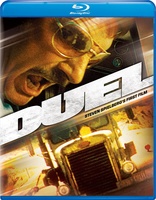Duel Blu-ray Movie
HomeDuel Blu-ray Movie 
Universal Studios | 1971 | 89 min | Rated PG | May 05, 2015Movie rating
7.8 | / 10 |
Blu-ray rating
| Users | 4.4 | |
| Reviewer | 4.0 | |
| Overall | 4.0 |
Overview
Duel (1971)
While traveling through the California desert for a business appointment, David Mann passes a smoky tanker truck. A game of cat-and-mouse quickly escalates into a life-and-death battle between David and the unseen trucker, with their vehicles as weapons.
Starring: Dennis Weaver, Jacqueline Scott, Eddie Firestone, Lou Frizzell, Gene DynarskiDirector: Steven Spielberg
| Mystery | Uncertain |
| Drama | Uncertain |
| Thriller | Uncertain |
Specifications
Video
Video codec: MPEG-4 AVC
Video resolution: 1080p
Aspect ratio: 1.85:1
Original aspect ratio: 1.37:1, 1.85:1
Audio
English: DTS-HD Master Audio 5.1 (48kHz, 24-bit)
English: DTS-HD Master Audio 2.0 Mono
Spanish: DTS 5.1
Subtitles
English SDH, French
Discs
50GB Blu-ray Disc
Single disc (1 BD)
Playback
Region free
Review
Rating summary
| Movie | 4.5 | |
| Video | 4.5 | |
| Audio | 4.0 | |
| Extras | 2.5 | |
| Overall | 4.0 |
Duel Blu-ray Movie Review
Man Vs. ???
Reviewed by Michael Reuben October 18, 2014At the time of this review, Duel was available on Blu-ray only as part of the Steven Spielberg Director's Collection. It is now separately available. I still recall the excitement of seeing Duel during its initial broadcast on ABC's Movie of the Week in November 1971. Even if you couldn't say why, it was obvious that this was something qualitatively different from even the best that broadcast television had to offer in the era before cable. Much of the reason was the sheer scope of the production, a sense that even the small screens of the time couldn't diminish. As Steven Spielberg explains in the featurette made for Duel's 2003 DVD release (and included here on Blu-ray), he had to began his directing career in TV to build a résumé, but his visual style was already that of a feature filmmaker. Duel uses more wide and medium shots than most TV films of the era. As a result, its closeups, especially of star Dennis Weaver's increasingly anguished face, register with even greater impact. The film was also an early demonstration of Spielberg's unique talent for photographing inanimate objects so that they seem to be alive. Spielberg's treatment of the menacing truck in Duel would turn out to be an excellent rehearsal for the recalcitrant mechanical shark in Jaws, for which the illusion of life was essential. (The director would later speak of "casting" the truck and having it "made up" daily as if it were a human actor.) And the toys that come alive in Close Encounters of the Third Kind manage to look unsettling just because of how they're photographed. But Duel had something besides directorial wizardry, and that was an ingenious script by visionary writer Richard Matheson, a frequent contributor to The Twilight Zone and the author of I Am Legend (multiple film adaptations), Button, Button (The Box) and Bid Time Return (Somewhere in Time). Matheson's screenplay for Duel, based on his short story of the same name, has the elemental simplicity of myth, which is one reason why the film still plays as effectively today as it did over forty years ago. Many explanations can be offered for the conflict at the heart of the story, but Matheson's genius, and Spielberg's gift, was to leave Duel open for all of them—or none of them.
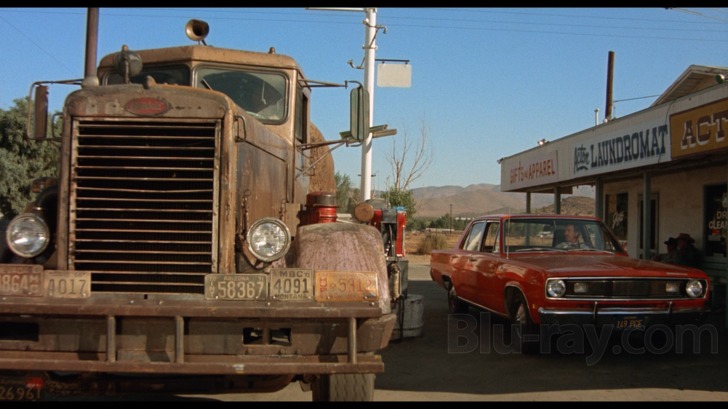
Duel requires very little setup. David Mann (Dennis Weaver, whose casting Spielberg enthusiastically endorsed because he liked him in Touch of Evil), leaves his modest Los Angeles home in an ordinary sedan to drive to a distant business meeting. On a desert road outside the city, David find himself behind a diesel tanker truck belching smoke, which he proceeds to pass. To David's surprise, however, the tanker shortly overtakes him, then plants itself in his path again. It's a challenge that quickly escalates into an increasingly violent contest between David and the unidentified trucker (stuntman Carey Loftin), who is never seen except as an occasional hand gesturing out the window or a pair of boots walking alongside the tanker. Indeed, as far as Duel is concerned, the truck itself is the enemy as much as the man driving it. In the few moments of quiet that he has, David struggles to comprehend the elemental force that has suddenly overwhelmed his life. At one point he refers to his situation as being "back in the jungle", but there many points in Duel where it feels as if machines themselves have turned on their creators and that the reason the malevolent trucker never appears is because he's simply an extension of the tanker itself. At other moments, especially during a long, tense sequence at Chuck's Café, a roadside diner peopled by a blue-collar clientele, where David scans the crowd nervously trying to identify his adversary, Duel seems to be about some sort of class warfare, or perhaps about a primal male struggle for dominance, as David, in his shirt and tie, tries to imagine himself negotiating a peaceful resolution. (His wife, played by Jacqueline Scott, has already berated him in a previous scene for failing to defend her honor at a cocktail party.) But this is no longer the city, and David no longer knows the rules. Perhaps the trucker views himself as king of that region's road and, without realizing that he'd done so, David trespassed on his turf. Spielberg allows David Mann and the viewer just enough time to reflect on these possibilities before the conflict escalates to deadly levels of violence, and there's no more time to think. The latter portion of Duel demonstrates the kind of bravura visual storytelling that immediately marked Spielberg as a major talent. The sequence in which the tanker's driver conveys to David that he has no choice but to continue their fight to the bitter end is a minor masterpiece. You could watch it without sound and still understand everything that's happening. (But it's better with sound.) Duel's initial TV presentation ran 74 minutes. After its favorable reception, Universal asked Spielberg to shoot additional scenes so that it could be expanded to a 90-minute feature for theatrical release, primarily in Europe, although the feature version also played a few theaters in the U.S. The longer version has generally been treated as the official cut since then, and it is the version released on Blu-ray. The opening sequence of David's departure was extended, and scenes involving a railroad crossing, a school bus and David's call to his wife were either added or lengthened. Although it would be interesting to have the original broadcast version for comparison, certainly nothing about the theatrical cut feels overly long, nor has it lost any of the visceral impact, even now when cell phones and GPS would have made it much easier for David Mann to get help from law enforcement. The primal fear—of being attacked by an irrational adversary who cannot be bargained with—remains the same.
Duel Blu-ray Movie, Video Quality 
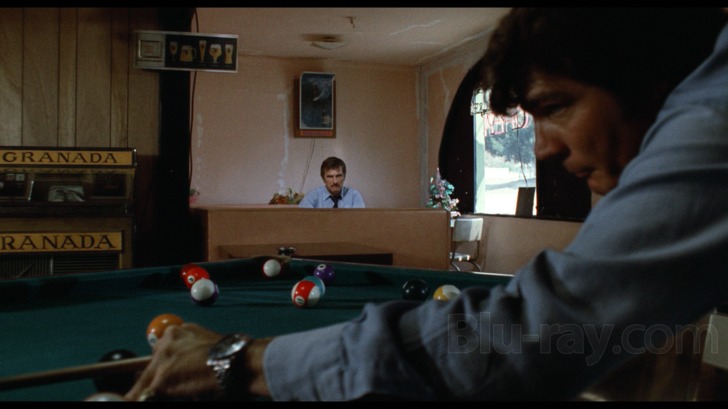
The 1.85:1 aspect ratio of Universal's Blu-ray of Duel will no doubt be a source of controversy, since it could be fairly argued that the film's original aspect ratio should be 1.33:1, which was its format on DVD. Then again, the OAR of this version of Duel, which was created for theatrical exhibition, was arguably 1.85:1; so it could also be said that the Blu-ray's presentation corrects the DVD's error. Spielberg was involved to at least some extent in the creation of the widescreen version, as evidenced by his shooting of the additional scenes and his reference in various interviews (including the "Conversation" in this disc's extras) to discovering that opening up the frame in some of the shots revealed that he was in the back seat of the car giving direction to Dennis Weaver. In a perfect world, two versions of Duel would be included, the 74-minute broadcast version framed at 1.33:1 and the 90-minute (technically, 89-minute) version framed at 1.85:1. As far as the 1.85:1 version on Universal's 1080p, AVC-encoded Blu-ray is concerned, the image capably reproduces the kinetic energy of the location cinematography by studio veteran Jack Marta (Cat Ballou, Plaza Suite). Detail is excellent in moments where the scenery isn't rushing past, and it's often much better than the screen captures indicate, because the camera itself is so frequently in motion that it's difficult to stop the action without creating motion blur. Although the image does not completely escape the processed look that is the hallmark of Universal catalog transfers, the digital tampering appears to be minimal. Natural-looking film grain is evident, and to the extent that any electronic sharpening has been used, the application is minimal. Contrast is strong throughout, and this is no doubt intentional for a film that its makers knew would be seen on TV screens with limited resolution. Because of the high contrast levels and a slight overbrightening, even strong colors are somewhat muted. For example, the red sedan driven by David Mann (the color was stipulated by Spielberg so that the car would stand out against the brown, green and gray landscape) isn't especially bright, although it is always distinctively red. The high quality of the Blu-ray's presentation is especially evident in the famous final confrontation between Mann's automobile and the tanker truck adversary: a long, continuous shot with multiple moving elements, all of which are rendered with impressive clarity and fine detail. It doesn't hurt that Universal has mastered Duel with a high average bitrate of 34.03 Mbps. The film is filled with many such scenes of complex action that make good use of the bandwidth.
Duel Blu-ray Movie, Audio Quality 
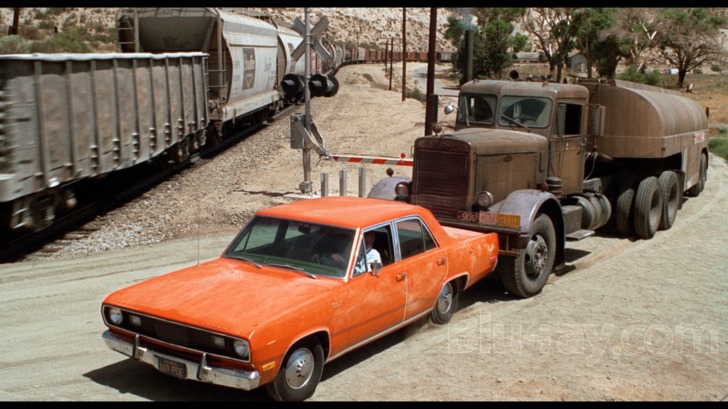
Duel was originally released in mono, which is supplied here in lossless DTS-HD MA 2.0 with identical left and right front channels. The soundtrack was remixed for 5.1 for the 2003 DVD release, and that mix is also offered as the default audio track in lossless DTS-HD MA. The remix is conservative, leaving almost all of the sound in front where it belongs, and adding only the slightest sense of stereo expansion to the elaborate sound mix, most of which had to be created after the fact with dubbing and foley. The roar of the truck, the sound of the highway rushing by, the blare of train whistles and the background noise of the lunch crowd in Chuck's Café are just some of the essential sonic elements that amplify the tension in Duel, and the track reproduces them with good fidelity and surprisingly broad dynamic range (far better than what most TV speakers could have managed in 1971). The inventive score by Billy Goldenberg (Play It Again, Sam), which Spielberg discusses in his interview in the extras, blends so effectively into the mix that you're often unaware of its unnerving contribution to the film's sense of peril.
Duel Blu-ray Movie, Special Features and Extras 
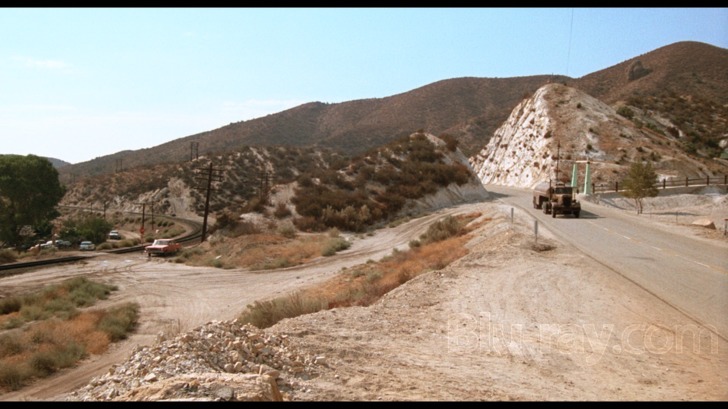
The extras have been ported over from Universal's 2003 "Collector's Edition" DVD of Duel, minus the production notes.
- A Conversation with Steven Spielberg (480i; 1.33:1; 35:44): In this 2001 documentary, Spielberg speaks at length about the making of Duel, providing fascinating technical detail about how he was able to make the film on location and still (almost) meet the tight production schedule, despite the dire predictions of his studio-assigned production manager. Spielberg's recall for how individual shots were accomplished and for specific technical challenges is astonishing.
- Steven Spielberg and the Small Screen (480i; 1.33:1; 9:27): This featurette provides an overview of Spielberg's "journeyman" work for TV, including Rod Serling's Night Gallery, Columbo and Marcus Welby, M.D.
- Richard Matheson: The Writing of Duel (480i; 1.33:1; 9:24): The author describes the origin of the short story, which was inspired by his own frightening encounter with a truck on the day of the Kennedy assassination. He proceeds to discuss the film adaptation, distinguishing between what he put on the page and what Spielberg (and Weaver, whose performance Matheson praises) added on their own.
- Photograph and Still Gallery (1080p; various; 3:30): The slide show plays on its own and is composed of production stills, behind-the-scenes photos, posters and lobby cards.
- Trailer (480i; 1.33:1; 1:00).
Duel Blu-ray Movie, Overall Score and Recommendation 
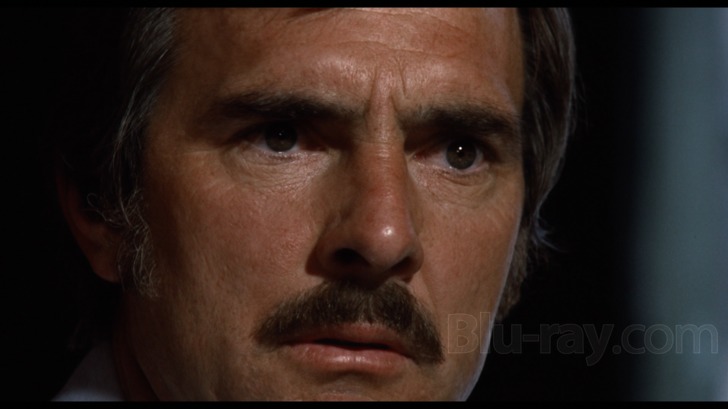
In his 2001 interview, Spielberg repeatedly thanks Duel for giving him a career, but the film also holds up as a gripping piece of entertainment, thanks to the happy combination of an enthusiastic young filmmaker finding his voice and a veteran writer of popular fiction honing his craft for expressing the essence of what scares people. While Universal's decision to present the widescreen version of the film on Blu-ray will no doubt trouble some fans, the result looks good and plays well. Anyone who wants to experience Duel for the first time shouldn't hesitate to do so in this presentation. Highly recommended.
Similar titles
Similar titles you might also like

Saboteur 4K
1942

Torn Curtain 4K
1966

Marnie 4K
1964

Cape Fear
1962

Obsession
Collector's Edition
1976

Peeping Tom 4K
1960

Vanishing Point
1971

Mulholland Drive 4K
2001

Gorky Park
Reissue
1983

Bringing Out the Dead 4K
Paramount Presents #47
1999

Electra Glide in Blue
4K Restoration
1973

The Crossing Guard
1995

The China Syndrome
1979

The 39 Steps
1935

Beyond the Reach
2014

Undertow
2004

Marathon Man 4K
1976

Rampage 4K
1987

The Night My Number Came Up
1955

Children of Men
2006
